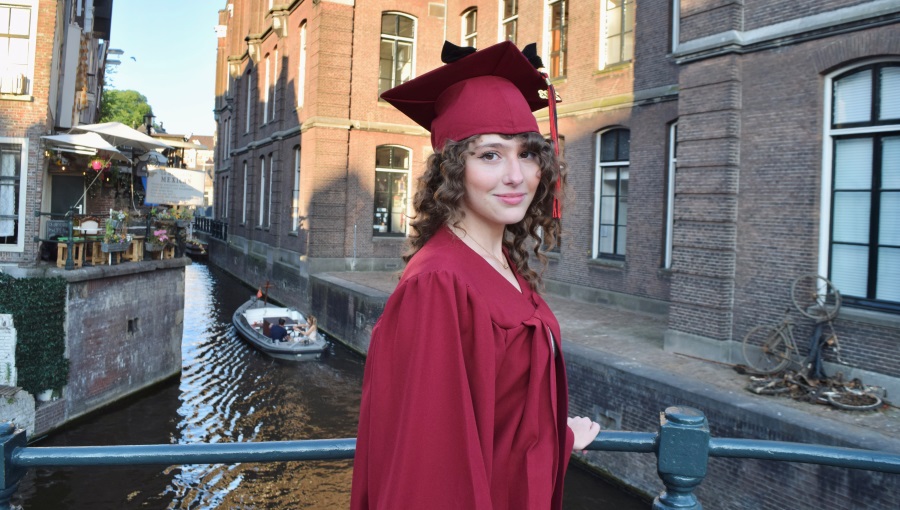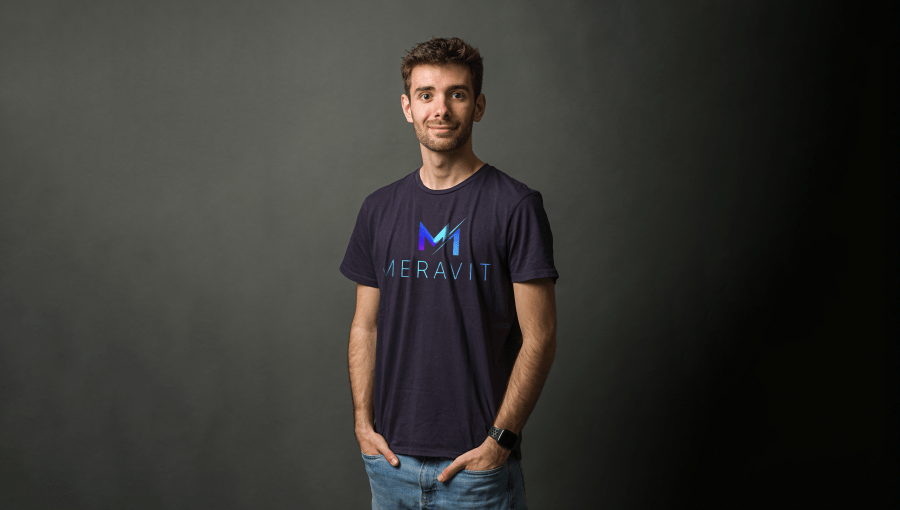Exploring AI Frontiers: A Conversation with Alumna Natalia Stanusch
Natalia Stanusch, who hails from Poland, graduated from JCU in Spring 2022 with a double major in Communications and Art History. After earning her M.A. in New Media and Digital Culture from the University of Amsterdam (UvA), she is currently a Ph.D. candidate at the Amsterdam School for Cultural Analysis (ASCA) at UvA. Her research focuses on new methodological approaches for investigating AI models.

How’s life after graduating from JCU? What brought you to UvA for your graduate studies?
Life’s very good, thanks! I’m currently back in Rome. I work remotely for the civil society organization AI Forensics, investigating algorithmic and AI systems behind digital platforms, while doing my Ph.D. at the University of Amsterdam. While I was at JCU, I knew I wanted to pursue a master’s degree and eventually a Ph.D. I already had some connections with Amsterdam since I wrote articles for the Institute of Network Cultures (INC). I am grateful to Professor Donatella Della Ratta who introduced me to INC when I expressed a desire to publish my research and engage more with media studies. I also knew that Amsterdam was a vibrant place in terms of experimental endeavors, art spaces, and exhibitions, and the Media Studies program at UvA is considered one of the best in the world, hence, the path forward was clear. I met and collaborated with brilliant people in the Media Studies department at UvA, and I am absolutely delighted that I am now working closely with Professor Richard Rogers and Dr. Natalia Sánchez Querubín as my Ph.D. supervisors.
Could you tell us about your Ph.D. thesis Seeing with, by, and of AI: Mapping the Regimes of Algorithmic Vision?
My dissertation explores new methodological approaches to unpacking and scrutinizing AI models via several case studies used as ‘entry points.’ For example, as part of my first chapter, I researched the hegemonic imaginaries and counter-imaginaries of AI perpetuated and clashing around Big Tech. I relied on a mixed-method approach, marrying qualitative ethnographic content exploration and digital methods. It’s a way to bring humanities and social sciences together and to take advantage of the basic architecture of the internet, such as online platforms and, by extension, algorithmic systems behind them. I am finding ways of studying what is at the focus of my research via the content of the media and the media themselves, i.e., the platforms and their ecologies, such as X, LinkedIn, TikTok, and Wikipedia. I will be presenting part of my research at the Association of Internet Researchers Annual Conference in the UK later this year, so I am very excited about that.
How did your double major in Art History and Communications help shape your academic career? Having more than one discipline-specific toolkit is not only a major aid but a necessity if we want to understand, challenge, or influence the world we are engaging with. It helps to broaden the horizon of what we think is possible and why we believe a technological or societal process works the way it does. Studying both art history and communications and media studies was a stepping stone for me, and looking back on it now, I see that it was one of the best academic decisions I have made. The opportunity to choose among different courses from various subjects that JCU and the American liberal arts approach offered, brought me joy and had a great impact on my professional and academic growth.
Doing the double major helped me shape my academic curiosity and voice, as it provided me with plenty of opportunities to venture into different fields, conduct, and present research in numerous ways, and get precious feedback. The time I spent in art history courses gave me a wide overview of methods and theories to unpack and explore objects as active agents existing in space and time. I am thankful to Professor Inge Hansen and Professor Sarah Linford, but also for the unforgettable and thought-provoking classes I had with Professor Peter Sarram, Antonio Lopez, Elizabeth Macias-Gutiérrez, Donatella Della Ratta, Kwame Phillips… I realized while at JCU that communications and media studies are a large area of diverse theories and practices, and there are many crossovers between media studies and art history, particularly within the specialized pathway I took. In my work, I merge topics that are in between art history and media studies, or I use both of the lenses to explore various issues.
What are some benefits and risks associated with utilizing AI models in our everyday lives?
It is a question I have been orbiting around for a while now. This year, I’ve been working with the AIxDESIGN collective on the topic of magic and AI, and one of the issues we are challenged with is how to reimagine and rethink AI to account for its benefits and risks. It’s been inspiring to work through the seemingly fundamental ideas and stories of what is commonly accepted as the “objective,” “rational,” or “right” way to develop, use, and sustain a given technology. Technology is not neutral, and it is not just a single biased application of one model but rather all of the theoretical and material infrastructure that sustains it. AI is an umbrella term that means everything and nothing today. Our questions, doubts, and hopes about technology have been with us since the beginning of society and culture. There’s nothing particularly new about AI as such. While AI models and their basic assumptions can and are useful in various domains of life, we have to recognize the socio-cultural and environmental entanglements and impacts each technology has. What we call for is a distrust of the AI outputs, abuses, and utopian promises that are being forced upon us as inevitable. The future is being made today, and there is still hope.
How does the academic environment in Amsterdam compare to your previous experience?
JCU prepared me for what I found in Amsterdam in terms of the academic environment. JCU and UvA are very different environments. The sheer number of students in the M.A. program was much larger than at JCU, so the feeling of community was different. There was a lot more focus on doing things on your own, figuring out what to do and how to do it within very short and intense intervals. The wonderful staff in the JCU library, the experience I gained by being a member of the Art History Society, and the truly diverse courses I took at JCU, all allowed me to find my way of studying, thinking, and working with others. Despite requiring hard work, the M.A. and now my Ph.D. are going pretty smoothly. I am still in contact with my mentors from JCU, whose advice and support have been crucial along the way.
What are your plans after obtaining your Ph.D?
I would like to continue merging my academic pathway with more practice and community-oriented work, such as civil society or arts and culture organizations. At JCU, I learned plenty from my professors about the meaningful ways they led their careers, and I would be happy to follow in their footsteps. I would definitely like to stay in academia, continue my research, learn, and teach. At the University of Amsterdam, I have already taught workshops and project-based classes and truly enjoyed the experience. But I would also be happy to return to my alma mater; all the roads lead to Rome in the end, so who knows?
What advice would you give to students interested in pursuing a similar career path?
Figure out what you’re interested in and what you feel you’re good at. It means you will have to make mistakes and realize that something is perhaps not for you, but all of this will help you build up the idea of who you are and who you want to be.
Learn languages, study, meet, and talk with people from the fields you’re interested in, and ask how to get involved. It might sound cliché, but there’s this saying that once the right opportunity comes your way, you need to be prepared to grasp it. But I think it’s more about trying to create those opportunities and being aware that some of them will work out at some point, so do not give up. You never know when or how you will come across something or someone who will become the North Star on your journey.
We live with people, and those around us can be the greatest support as mentors and friends. Stay cool and have some fun.





